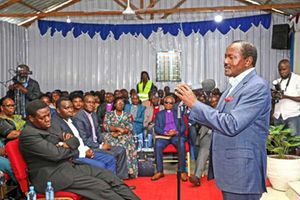Waiguru: Council of Governors pushing for gender rule in counties

Council of Governors chairperson Anne Waiguru.
What you need to know:
- Governor’s star has been shining brighter since she joined elective politics in 2016, after serving the country as Devolution CS.
- She is among the most powerful women in the country and the first female governor to win a re-election.
Ms Anne Mumbi Waiguru’s star has been shining brighter and brighter since she joined elective politics in 2016. The former civil servant – who worked behind the scenes before 2013, when she was appointed Cabinet Secretary for Devolution – is now one of the most powerful women in the country.
She is not only the first female governor to win a re-election but also the first female to chair the Council of Governors (CoG).
In an interview, Ms Waiguru talks to nation.Africa on her achievements and challenges, gender issues, empowerment initiatives, and county bosses’ relationships with the Controller of Budget (CoB), among other issues.
How do you feel being the first woman to win a re-election as governor and the first to chair the CoG?
It is a great honour for me to be entrusted by my Kirinyaga people with this second term mandate where we can together grow the dividends to our county. It motivates me to work harder to meet their expectations. I recognise the responsibility bestowed on me by my fellow governors. The opportunity to continue championing policies that get us closer, as the 47 counties, to credible public sector leadership and governance, as well as sustainable community investment programmes, is a blessing that I do not take for granted.
What have you achieved so far as CoG chairperson?
The CoG has in its first quarter worked within the framework of intergovernmental cooperation to ensure all outstanding devolved functions and costing are transferred to the counties. This will remove governance duplication, strengthen devolution, support county-based economic and private sector investments, and improve the quality of public service delivery in the counties.
The CoG has enhanced relationships with our development partners, thus increasing funding to critical sectors. We have also petitioned for the streamlining of the process of transferring funds, conditional grants and donor funding to the counties. The CoG has negotiated for the release of funds arrears from the national government and continues to advocate timely release of the same to enable smooth running of the devolved functions.
We have held capacity building forums for governors and their deputies and all our county executives on integrated planning, budgeting and performance management; effective policy execution; and quality service delivery.
The Executive and the CoG have negotiated and arrived at key policy proposals to ensure we are working as one. Some of the critical outcomes have been on alternative dispute resolutions between different levels of government and agencies, county policing structures chaired by governors as the bedrock of successful policing and crime prevention, healthcare service support by reviewing equipment management and facilitating community health workers.
What are some of the actions you are taking as the CoG boss to ensure counties adhere to the two-thirds gender rule in appointments?
Part of our CoG capacity building for governors and deputy governors is to impress upon them that as executive leaders, they have obligations to adhere to the Constitution. Equity is the underlying principle and anchor for devolved governments, and it should, therefore, reflect on how gender participation in decision-making and leadership leads to a more equal Kenya. The CoG has a Gender committee that addresses adherence to related laws.
What are some of the challenges you face as the CoG chair?
Inadequate and delayed funding from the national government remains the biggest challenge in the implementation of our mandate. These delays impact on development ambitions as counties find themselves prioritising and hedging for recurrent expenditure.
I also note that 10 years into devolution, some ministries have yet to understand the spirit of instituting devolved governments through functions implied or clearly provided for by the Constitution.
Big budget allocations to national ministries, departments and agencies must significantly be reduced as most of them have only policy and regulatory mandates, while the counties hold the responsibility for service delivery. I am happy to report that this issue was mostly addressed during our ninth summit.
The issue of drought and starvation is really distressing and a big challenge to our counties, including quite a number that were previously food-secure.
Emergency responses to save lives and livelihoods have exerted a lot of pressure on us in the past few months. Our relationship with the CoB is also not settling where the law anticipates it should. Their frequent overreach into auditing roles impedes the smooth running of county functions.
What advice do you have for first-term governors who are barely six months in office?
I would advise the first-term governors to focus on delivering on their election pledges to the electorate. They should foster a good working relationship with their county assemblies so that together they can implement development programmes and the transformation that the electorate desires. Counties are the engine of economic development. They should also include the public in setting their priorities for more impactful services. Their development plans should also go beyond their tenure for continuity. First-term governors need to focus on the job at hand and not be distracted. Let us all strive to deliver on what we promised our people when we sought their votes. I wish every governor great success.
As a second-term governor, what are some of the initiatives you’re proud of so far?
As you are aware, I ran on the campaign platform of Wira Warie (let the work speak for itself) and I am very proud of the achievements we have made. We have completed Kerugoya Level Five County Referral Hospital, a state-of-the-art facility that will offer specialised services previously sought in Nairobi. We are also upgrading three level-3 hospitals—Kianyaga, Kimbimbi and Sagana—to level four and completing the construction of about 20 dispensaries.
We have installed a hospital management information system that will streamline service delivery at major health facilities. We also implemented the Wezesha Kirinyaga economic empowerment programme to support farmers to diversify crops, increase production, process harvests and add value. We farm tomatoes, avocados, poultry, dairy, and coffee. This programme increased incomes for Kirinyaga farmers by over Sh1,000 per day per household.
On trade, we have built 16 markets, which include three aggregation centres for tomatoes and avocados. We are now in the process of putting up Sagana Industrial Park to close the value chain.
On infrastructure, we graded over 2,500km of road and murramed over 500km under our Nyorosha Barabara programme to ensure farmers have access to markets.
We also developed our spatial plans and embarked on upgrading towns and municipalities. We have done tarmacking, paving and installed street lights and drainage systems for Wanguru, Kagio, Kerugoya and Kianyaga.
Other programmes are the ongoing construction of a modern fire station in Kutus, over 70 water projects, upgrade of ECDE centres and provision of bursaries to over 30,000 students. My focus in the next five years is to build on that which we have done.
Do you have any mentoring programmes for girls and young women?
I have a long list of cross-generational mentorship beneficiaries from my days in the Treasury, some of whom are now in top government positions and in elective or nominated offices. I believe mentorship is a long chain of holding up one another and guiding each other to our own source of power.
I am the patron of Daughters of the Mountain and Daughters of Kenya, who are active participants in policy, governance and political advocacy. In my county, a number of senior officers in key dockets are young women, who, under my guidance, are doing well and have climbed the leadership ladder by sharpening their performance. I also mentor and sponsor bright young girls through their secondary and university education. I monitor their progress in school and occasionally have them over for talks.
Some people argue that being a Ruto ally makes you soft on the national government when counties face delays in disbursement of funds. What do you say about this?
My role as chair of the CoG is not to antagonise or frustrate the President; rather, it is to ensure governors and their counties are heard effectively. A good working relationship considers the interests of all parties. The President cannot meet his development agenda without the counties.
The National Treasury is part of the Executive and our success on timely disbursement requires that we have and keep the channels of communication, cooperation, and consensus open and amicable. We have also succeeded in representing the counties in all institutions that align with our constitutional mandate.
There has been an uproar over the skyrocketing cost of living; do you think the Kenya Kwanza government has an immediate solution to this?
That the cost of living being high is obvious. To suggest that it’s been caused by the current administration is dishonest. The negative trajectory of the cost of living commenced and intensified during the handshake government.
The unfortunate solution then was the subsidy programme. This was an artificial response that unduly benefitted select cartels while injuring the economy severely.
The Kenya Kwanza government has put in place measures for real solutions to Kenya’s economic woes and some areas, including reduced prices of some commodities, are showing. In time, other far-reaching and long-term results will be obvious. This is hardly the time for high-octane politics. The solution may not be instant, but, eventually, we will get to manageable levels.
Any advice to young women who are dreaming of venturing in politics?
I would advise them to go for it, be prepared to learn, if you fail once try again and again until you get what you want. There is no dress rehearsal for women, however new you are. The lights are on, the curtains are up and every action counts for the next woman in the eyes of the public.
Politics is dynamic, and you must be willing to study politics as it presents itself locally. You should make a conscious and firm decision that politics is what you want to do. You then should actively and continuously engage with the community you intend to serve. Remember that nothing comes on a silver platter.





